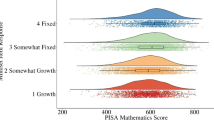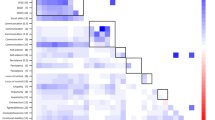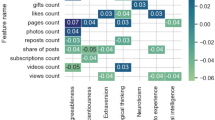Abstract
IN a recent communication1, science sixth forms in English schools were shown to attract boys who have high intelligence quotients but relatively low scores on ‘open-ended’ tests, that is, tests consisting of questions for which no one right answer exists, and which seem to have some bearing on the potentiality for original work2. Two types of boy were distinguished: the ‘converger’, who excels in the close reasoning of the intelligence test but lacks fluency on ‘open-ended’ tests; the ‘diverger’, who is exceptionally fluent but relatively weak in close logical argument. This convergent/divergent distinction, corresponding roughly to the science and arts sides of the sixth form, correlates with a variety of other differences. There are, in all, five further sets of data to be reconciled: (1) Convergers are relatively unlikely to express attitudes which are unusual in the statistical sense (P = 0.025 χ2 test with Yates's correction, n = 95), or which are liberal and non-authoritarian (P = 0.005). They are unlikely to show emotional involvement in their views (P = 0.005), or, more specifically, to admit that they are unhappy at school (P = 0.005). (2) Convergers' interests and hobbies tend to be practical and out-of-doors rather than—with the exception of music—cultural or political (P = 0.005); and the range of their interests tends to be narrow rather than broad (P = 0.025). (3) When asked to suggest uses for everyday objects or to draw, convergers are relatively unlikely to give responses involving humour (P = 0.05) or personal violence (P = 0.001). (4) Convergers are relatively unlikely to make errors in doing the intelligence test (P = 0.01). (5) Within the intelligence test, convergers show a bias of ability towards questions expressed in numbers and patterns rather than in words (P = 0.005), even though the logical operations performed with these three kinds of symbol are identical. The bias among divergers is the reverse.
This is a preview of subscription content, access via your institution
Access options
Subscribe to this journal
Receive 51 print issues and online access
$199.00 per year
only $3.90 per issue
Buy this article
- Purchase on Springer Link
- Instant access to full article PDF
Prices may be subject to local taxes which are calculated during checkout
Similar content being viewed by others
References
Hudson, L., Nature, 196, 601 (1962).
Getzels, J. W., and Jackson, P. W., Creativity and Intelligence (Wiley, New York, 1962).
Gordon, R., Stereotypy of Imagery and Belief as an Ego Defence, Brit. J. Psychol. Mono. Supp. (1962).
Hudson, L., Brit. J. Educ. Psychol. (in the press).
Author information
Authors and Affiliations
Rights and permissions
About this article
Cite this article
HUDSON, L. Personality and Scientific Aptitude. Nature 198, 913–914 (1963). https://doi.org/10.1038/198913a0
Issue Date:
DOI: https://doi.org/10.1038/198913a0
This article is cited by
-
Wissenschaftliche Kreativität
Zeitschrift für allgemeine Wissenschaftstheorie (1977)
-
Intellectual Style and High School Science
Nature (1968)
-
Divergent Thinking and Science Specialists
Nature (1967)
-
Future Open Scholars
Nature (1964)
Comments
By submitting a comment you agree to abide by our Terms and Community Guidelines. If you find something abusive or that does not comply with our terms or guidelines please flag it as inappropriate.



